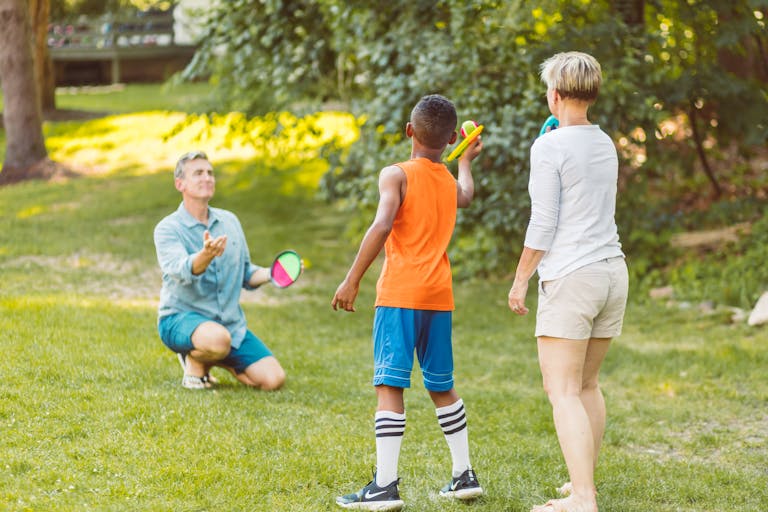Healthy Family Lifestyles: Simple Habits That Make a Big Impact
Family life is a balancing act. One day you’re blending up kale smoothies and feeling like a domestic god or goddess, and the next you’re surviving on frozen chicken nuggets and a prayer. If that sounds familiar, you’re definitely not alone.
Trying to create a healthy family lifestyle can feel overwhelming, especially when you’re juggling work, school runs, and a never-ending laundry pile. The good news? It doesn’t have to be complicated or stressful. Small, simple habits can make a huge impact on your family’s well-being. Nurturing strong relationships with loved ones is also a key part of a healthy family lifestyle, as these connections provide emotional support and strengthen family bonds.
This post is your guide to easy, actionable tips for adding more fitness, nutritious meals, and wellness practices into your daily routine—without the chaos. We’ll cover simple ways to get moving, strategies for healthy meals that won’t cause a dinner-table meltdown, and small wellness habits for the whole crew, including quality bonding time spent with loved ones.
Simple Fitness for Busy Families
Getting your family active doesn’t require a pricey gym membership or a rigid schedule. The key is to make movement fun and turn it into quality bonding time. Play and exercise can be combined—think of turning simple activities into playful challenges—to make movement enjoyable for everyone. It’s not about perfection; it’s about getting everyone’s heart rate up with a smile.
Weekend Adventures
Weekends are a perfect opportunity for some family fun. Plan an activity that gets everyone moving. This could be a hike on a local trail, a bike ride through the neighborhood, or even a long walk to the local ice cream shop. Encourage your family to explore new trails, parks, or activities during your weekend adventures. The destination is just a bonus; the real win is the time spent together.
15-Minute Dance Breaks
Never underestimate the power of a spontaneous dance party. When you notice the energy in the house is either too low or way too high, put on a favorite playlist and have a 15-minute dance break in the living room. It’s a fantastic way to burn off some steam, shake off a tough day, and make some hilarious memories.
Incorporate Fitness into Routines
You can also weave physical activity into your existing routines. Look for small opportunities to get more steps in.
- Active Chores: Turn cleaning or yard work into a team challenge. See who can rake the most leaves or put away toys the fastest. Making it a game transforms a boring task into a fun, active experience. Parents can model positive behavior by participating enthusiastically, showing children that being active is enjoyable and important.
- Walking Challenges: Small changes add up. Park a little farther away at the grocery store or at school pickup. Take the stairs instead of the elevator. These little bursts of activity contribute to a healthier lifestyle over time and help shape healthy behavior in children.
Healthy Meals Without the Stress
Let’s be real: convincing kids to eat their veggies can feel like a high-stakes negotiation. But encouraging healthy eating doesn’t have to mean preparing gourmet, five-star meals every night. Focus on small, manageable changes that feel doable for your family. Managing portions is also important—serving appropriate portions can help promote healthy eating habits and model good nutrition for your kids.
Keep It Simple
Start with small adjustments that don’t feel like a total dietary overhaul.
- The “One New Thing” Rule: Introduce one new vegetable or healthy food each week. Serve it alongside family favorites without any pressure. The goal is exposure, not immediate acceptance. It might take a few tries, but eventually, curiosity might win out.
- Build-Your-Own Nights: Taco bars, personal pizza stations, or salad bars are your best friends. Set out a variety of toppings (with plenty of healthy options) and let everyone customize their own meal. Giving kids a sense of control makes them more likely to try new things.
Get Kids Involved
Turning mealtime into a family effort can have magical results. When kids have a hand in preparing the food, they feel a sense of ownership and pride.
- Kitchen Helpers: Assign age-appropriate tasks. Toddlers can wash vegetables or stir ingredients, while older kids can help measure, mix, or even chop. This not only teaches them valuable life skills but also makes them more invested in the meal.
- Snack Prep: Avoid the “I’m hungry!” cries with a designated snack station. Spend a little time on the weekend prepping grab-and-go options like sliced fruit, cheese sticks, yogurt cups, or small bags of trail mix. It makes healthy choices easy for everyone.
Wellness Habits for the Whole Family
A healthy lifestyle isn’t just about what you eat or how much you move. Prioritizing mental and emotional well-being is just as important for a thriving family. Wellness habits can help reduce stress for both children and adults, making it easier for everyone to manage daily challenges. Finding joy in daily routines is also an important part of family wellness.
Prioritize Connection
Creating space for connection helps everyone feel supported and understood.
- Screen-Free Evenings: Designate 30 minutes before bed as a screen-free zone. Use this time for reading stories, sharing about your day, or just cuddling. It’s a simple way to wind down and connect without digital distractions.
- Daily Check-Ins: A “high-five/low-five” practice at the dinner table can be a great ritual. Each person shares one good thing (a high-five) and one challenging thing (a low-five) from their day. It opens up communication and teaches kids it’s okay to talk about both the good and the tough stuff.
Parent Well-Being Matters, Too
Remember that oxygen mask analogy? It’s a cliché for a reason. A happy, healthy family starts with you. Taking care of your own well-being isn’t selfish; it’s essential. Many parents are struggling to find time for self-care, and that’s completely normal. Find small moments for self-care, whether it’s a 10-minute solo walk, listening to a podcast, or simply enjoying a cup of coffee in peace before the house wakes up.
Why These Habits Matter
Building these small habits together goes beyond boosting physical health. It deepens family connections, nurtures emotional strength, and lays the groundwork for your children’s future success. Raising children comes with unique challenges and rewards, and effective parenting plays a crucial role in shaping their future. Through these actions, you’re teaching your child invaluable skills—teamwork, self-discipline, and the importance of caring for their bodies and minds—tools they’ll carry with them for a lifetime.
Research shows the importance of understanding the complex relationships between parenting, child behavior, and health outcomes. Every moment you invest in these habits is a step toward shaping confident, capable individuals. It’s not just about the present; it’s about creating a legacy of health, love, and resilience that will empower your family for generations, with the aim to support children’s well-being through informed parenting choices.
How to Get Started
Feeling motivated to start some new habits, but not sure where to begin? It’s easy to feel overwhelmed when trying to make changes, especially with a busy family schedule. Building new habits can be especially tough during challenging times, but the good news is that it doesn’t have to feel like a chore. By taking small, intentional steps, you can create positive changes that everyone in the family can enjoy. Here’s how to get started:
- Make it fun: Frame new habits as games or challenges to keep everyone engaged and excited. The more enjoyable it feels, the more likely it is to stick.
- Schedule it: Pencil in family activities to make them a priority. Putting it on the calendar ensures it doesn’t get lost in the shuffle of daily life.
- Involve everyone: Let each family member have a say in what new habit to try. This applies to all family members, whether you’re a single parent, married, or part of a larger household. When everyone feels included, they’re more likely to participate enthusiastically.
- Start small: Focus on one small habit at a time. For example, commit to a 10-minute family walk after dinner rather than trying to add too many changes at once.
- Celebrate wins: Acknowledge progress, even the small steps. Celebrate milestones with a fun activity or treat to keep motivation high.
- Visualize progress: Use a habit tracker, chart, or stickers to show how far you’ve come. Seeing visible progress can inspire everyone to keep going.
- Pair habits together: Link a new habit with something you already do, like stretching while watching TV or tidying up during a favorite song.
- Be patient: Change takes time, so don’t get discouraged if it doesn’t happen overnight. Consistency is key, and perfection isn’t required to see results.
- Use support resources: If your household or family members need extra support, there are programs such as an Employee Assistance Program (EAP) available. These resources offer counseling, mediation, and relationship support for employees and their families, including children. Many programs provide 24-hour access to assistance. For more information, contact your EAP provider for available resources and hours.
Your Turn: Small Habits, Big Impact
Building a healthy family lifestyle doesn’t require a complete life overhaul. It’s about the small, consistent efforts—the family dance parties, the shared meal prep, and the screen-free wind-downs. There is no “perfect” family lifestyle. It’s about finding what works for you and your crew. Start small, be consistent, and don’t forget to celebrate the wins along the way.
What’s one healthy habit you’ll try with your family this week? Share your ideas in the comments below—we’d love to hear them!







